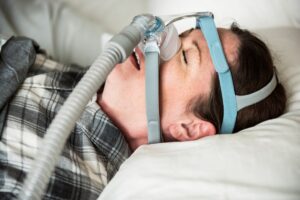Most people associate sleep apnea with loud snoring or restless nights, but the effects of this sleep disorder reach far beyond poor sleep. In fact, sleep apnea and heart disease are deeply connected, and untreated sleep apnea can significantly increase your risk of serious cardiovascular problems — including high blood pressure, arrhythmias, stroke, and heart failure.
Understanding this link can be lifesaving, especially if you or a loved one is showing symptoms of sleep apnea but hasn’t yet sought treatment.
What Happens to the Heart During Sleep Apnea?
Sleep apnea is characterized by repeated interruptions in breathing during sleep. The most common form, obstructive sleep apnea (OSA), occurs when the muscles in the upper airway relax and block airflow. Each time this happens, oxygen levels drop, and the brain is forced to jolt the body awake to resume normal breathing.
These episodes — which can happen dozens or even hundreds of times per night — cause a chain reaction in the body. Every time the brain senses low oxygen, it:
- Triggers a surge of adrenaline
- Raises your heart rate
- Increases blood pressure
- Prevents deep, restorative sleep
Over time, this puts a tremendous strain on your cardiovascular system.
How Sleep Apnea Increases the Risk of Heart Disease
There are several ways that sleep apnea increases cardiovascular risk, particularly if it goes untreated:
1. High Blood Pressure
The repeated drops in oxygen levels cause your body to go into “fight or flight” mode. This stress response raises your blood pressure, and over time, can lead to chronic hypertension — one of the most common contributors to heart disease.
2. Irregular Heartbeat (Arrhythmias)
Sleep apnea is associated with an increased risk of atrial fibrillation (AFib) and other arrhythmias. When oxygen drops repeatedly during the night, it can disrupt the heart’s electrical system and lead to abnormal rhythms, increasing the risk of stroke or sudden cardiac events.
3. Heart Failure
The long-term strain caused by low oxygen and high blood pressure can weaken the heart, leading to heart failure. In people with pre-existing heart disease, sleep apnea makes symptoms worse and can accelerate progression.
4. Coronary Artery Disease
Chronic inflammation, which is triggered by repeated sleep disruptions, contributes to the buildup of plaque in the arteries — known as atherosclerosis. This increases the likelihood of coronary artery disease and heart attacks.
Shared Risk Factors
Some of the same risk factors that contribute to sleep apnea also increase the chances of developing heart disease, including:
- Obesity or excess weight
- Smoking
- Sedentary lifestyle
- Poor diet
- Diabetes
- Family history of heart disease
- Menopause or hormone shifts
These overlapping factors make it even more critical to evaluate symptoms of both sleep apnea and cardiovascular issues together.
The Research is Clear: Sleep Apnea Is a Cardiovascular Risk Factor
Multiple large-scale studies have confirmed the strong association between sleep apnea and cardiovascular disease:
- People with moderate to severe sleep apnea are more likely to develop hypertension, even if they have no history of high blood pressure.
- Untreated OSA increases the risk of heart attacks, heart failure, and strokes — especially in men over 40.
- Patients with both sleep apnea and heart disease have a higher risk of sudden cardiac death, especially during sleep.
The American Heart Association and other leading medical organizations now recommend routine screening for sleep apnea in patients with high blood pressure or heart problems.
Treating Sleep Apnea Can Help Protect Your Heart
The good news is that treating sleep apnea can significantly reduce your cardiovascular risk. Studies show that consistent treatment leads to:
- Lower blood pressure
- Fewer arrhythmias
- Improved oxygen saturation
- Better heart rate variability
- Reduced inflammation
- Improved quality of sleep and energy during the day
Common treatment options include:
- CPAP therapy (continuous positive airway pressure)
- Oral appliance therapy (for mild to moderate OSA)
- Weight loss and lifestyle changes
- Surgical interventions (in more severe cases)
Don’t Wait — Address Sleep and Heart Health Together
If you’ve been diagnosed with heart disease or are at risk, and you experience snoring, fatigue, or breathing issues during sleep, it’s time to take your symptoms seriously. Sleep apnea may be silently straining your heart every night.
A simple sleep evaluation — often done at home — can confirm whether sleep apnea is part of the picture. With the right sleep solutions, you can protect your heart, restore restful sleep, and regain your energy and focus during the day.
Frequently Asked Questions (FAQs)
What heart conditions are linked to sleep apnea?
Sleep apnea has been linked to high blood pressure, atrial fibrillation, heart failure, stroke, and coronary artery disease. The condition puts continuous stress on the cardiovascular system due to repeated oxygen deprivation during sleep.
Can sleep apnea cause a heart attack?
Yes. Untreated sleep apnea can increase the risk of heart attacks, especially in people with other risk factors like obesity or high blood pressure. The frequent oxygen drops and adrenaline surges during the night can strain the heart over time.
Does treating sleep apnea improve heart health?
Absolutely. Treatment with CPAP, oral appliances, or lifestyle changes can help reduce blood pressure, prevent arrhythmias, and improve overall cardiovascular function. Patients often experience better sleep and improved daytime energy as well.
Can a heart patient develop sleep apnea?
Yes. In fact, heart failure patients are at increased risk of developing both obstructive and central sleep apnea. Many cardiologists now refer patients for sleep studies as part of standard care for heart conditions.
How can I tell if my sleep apnea is affecting my heart?
If you have symptoms of both sleep apnea (snoring, gasping, fatigue) and heart issues (palpitations, shortness of breath, high blood pressure), you may be experiencing a link. A sleep study combined with cardiac testing can confirm the connection.






